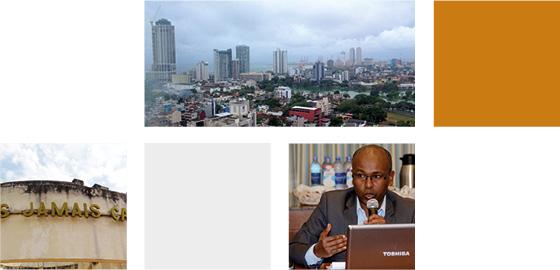Causes of and Solutions to Social Conflicts in Contexts of Weak Public Institutions or State Fragility
The thematic module Social Conflicts puts the emphasis on conflicts that result from particular types of deficiencies of public institutions, state fragility and the different variations of governance capabilities, as well as on ways and means for mitigating such deficiencies and reducing or avoiding conflicts.
Portrait
The research module focuses on three areas and the interactions between them: social conflicts; weak public institutions; and state fragility.
Conflicts , in the context of the r4d programme, can be violent or non-violent. They may range from inter- and intrastate wars to lower intensity violent conflicts, civil unrest and primarily non-violent social conflicts that undermine state capacities.
Weak public institutions involve settings in which political and/or social institutions are highly dysfunctional or have even collapsed. Such settings may range from failed states to war-torn societies in the process of rebuilding a political system to settings characterised by endemic corruption, strong inequality and a high degree of political instability.
State fragility involves a lack of institutional, organisational and financial capacity to perform basic state functions in governing population and territory. State capacity is achieved through political processes that foster and reinforce constructive relations within society and between the state and society. Enhanced state capacity, if achieved and exercised in democratic ways, strengthens state legitimacy and contributes to state resilience.
The three main research topics of the module are:
- Political reconstruction and democratisation processes in fragile and conflict-prone states
- Conflicts over scarce natural resources
- Chronic causes and consequences of state fragility and weakness of public institutions
Schedule
$(document).ready(function() {
/*
* Simple image gallery. Uses default settings
*/
$('.fancybox').fancybox();
/*
* Different effects
*/
// Change title type, overlay closing speed
$(".fancybox-effects-a").fancybox({
helpers: {
title : {
type : 'outside'
},
overlay : {
speedOut : 0
}
}
});
// Disable opening and closing animations, change title type
$(".fancybox-effects-b").fancybox({
openEffect : 'none',
closeEffect : 'none',
helpers : {
title : {
type : 'over'
}
}
});
// Set custom style, close if clicked, change title type and overlay color
$(".fancybox-effects-c").fancybox({
wrapCSS : 'fancybox-custom',
closeClick : true,
openEffect : 'none',
helpers : {
title : {
type : 'inside'
},
overlay : {
css : {
'background' : 'rgba(64,64,64,0.85)'
}
}
}
});
}); .fancybox-custom .fancybox-skin {
// box-shadow: 0 0 50px #222;
}
body {
max-width: 1356px;
margin: 0 auto;
}Review Panel
The Review Panel was active from 2013-2020 and was responsible for the evaluations and monitoring of the r4d projects in this module.
- Professor Dr. Dirk Messner , President of the Federal Environment Agency, Germany (Panel President)
- Dr. Ana Elisa Cascao , Center for International Studies - University Institute of Lisbon, Portugal
- Professor Dr. Francisco Gutiérrez Sanín , Instituto de Estudios Políticos y Relaciones Internacionales, Universidad Nacional, Bogotá, Colombia
- Professor Dr. Katharina Michaelowa , Department of Political Science, University of Zurich, Switzerland (SNSF Delegate)
- Dr. Norbert Ropers , Peace Resource Collaborative, Chulalongkom University and Institute of Peace Studies, Prince of Songkla University, Bangkok, Thailand
- Nils Rosemann , Focal Point Conflict and Human Rights, Swiss Agency for Development and Cooperation, Berne, Switzerland (SDC Delegate)
- Professor Dr. Gerald Schneider , University of Konstanz, Germany
- Prof. Dr. Marjo de Theije , Department of Social and Cultural Anthropology, Vrije Universteit Amsterdam, The Netherlands
Research Network
$(document).ready(function() {
/*
* Simple image gallery. Uses default settings
*/
$('.fancybox').fancybox();
/*
* Different effects
*/
// Change title type, overlay closing speed
$(".fancybox-effects-a").fancybox({
helpers: {
title : {
type : 'outside'
},
overlay : {
speedOut : 0
}
}
});
// Disable opening and closing animations, change title type
$(".fancybox-effects-b").fancybox({
openEffect : 'none',
closeEffect : 'none',
helpers : {
title : {
type : 'over'
}
}
});
// Set custom style, close if clicked, change title type and overlay color
$(".fancybox-effects-c").fancybox({
wrapCSS : 'fancybox-custom',
closeClick : true,
openEffect : 'none',
helpers : {
title : {
type : 'inside'
},
overlay : {
css : {
'background' : 'rgba(64,64,64,0.85)'
}
}
}
});
}); .fancybox-custom .fancybox-skin {
// box-shadow: 0 0 50px #222;
}
body {
max-width: 1356px;
margin: 0 auto;
}The 3 projects in the thematic module Social Conflicts started in 2014. They represent transnational research partnerships between 12 countries and Switzerland, involving 17 grantees.
Events
See events page .
News

